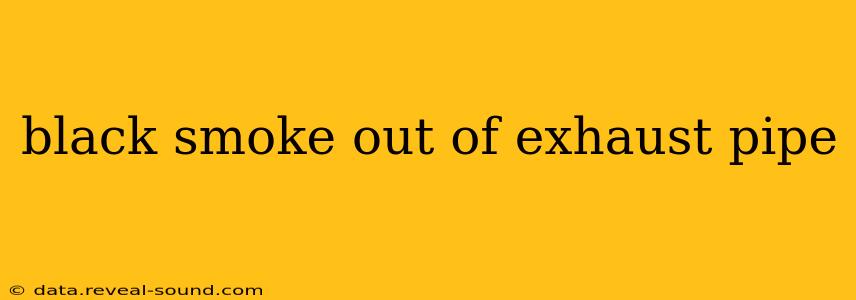Seeing black smoke billowing from your exhaust pipe is never a good sign. It indicates a serious problem with your vehicle's combustion process, potentially leading to costly repairs if ignored. This comprehensive guide will delve into the common causes of black smoke, how to diagnose the issue, and the necessary steps to resolve it. Understanding the source of the problem is crucial for preventing further damage and ensuring the longevity of your vehicle.
What Causes Black Smoke From the Exhaust?
Black smoke is primarily caused by incomplete combustion of fuel. This means that the engine isn't burning all the fuel efficiently, resulting in unburnt hydrocarbons being expelled through the exhaust. Several factors contribute to this inefficient burning:
-
Rich Air-Fuel Mixture: The most common culprit. A rich mixture means there's too much fuel and not enough oxygen in the combustion chamber. This leads to excessive fuel being expelled as soot, manifesting as black smoke.
-
Faulty Fuel Injectors: Clogged or malfunctioning fuel injectors can deliver an inconsistent or excessive amount of fuel, leading to a rich mixture and black smoke.
-
Clogged Air Filter: A clogged air filter restricts the airflow into the engine, disrupting the air-fuel ratio and causing a rich mixture.
-
Problems with the Mass Airflow Sensor (MAF): The MAF sensor measures the amount of air entering the engine. A faulty sensor can provide incorrect readings, leading to an inaccurate fuel mixture.
-
Vacuum Leaks: Leaks in the intake system can disrupt the air-fuel mixture, contributing to incomplete combustion and black smoke.
What Does Black Smoke Mean? Different Shades & Their Implications
While black smoke generally points to a rich fuel mixture, the shade can offer further clues:
-
Dark, thick black smoke: This strongly suggests a very rich mixture, often indicating a significant problem like a faulty fuel injector or a major vacuum leak.
-
Lighter black smoke (greyish-black): This might suggest a less severe problem, possibly a slightly rich mixture caused by a partially clogged air filter or a minor vacuum leak.
-
Black smoke accompanied by other symptoms: If the black smoke is accompanied by other issues like rough idling, misfires, or decreased engine power, it points to a more complex problem that requires immediate attention.
How to Diagnose Black Smoke From Your Exhaust
Diagnosing the cause of black smoke requires a systematic approach:
-
Visual Inspection: Begin by visually inspecting the engine bay for any obvious leaks, loose connections, or damaged components. Check the air filter for clogging.
-
Check Engine Light (CEL): If the CEL is illuminated, use an OBD-II scanner to retrieve diagnostic trouble codes (DTCs). These codes can provide valuable clues about the potential cause of the problem.
-
Professional Diagnosis: For complex issues or if you're unsure about the diagnosis, it's best to take your vehicle to a qualified mechanic. They have the tools and expertise to accurately diagnose and repair the problem.
How to Fix Black Smoke From the Exhaust: Solutions
The solution will depend on the underlying cause:
-
Replace a Clogged Air Filter: A simple and inexpensive fix.
-
Repair or Replace Fuel Injectors: This is often a more involved repair and might require specialized tools and expertise.
-
Fix Vacuum Leaks: Identifying and repairing vacuum leaks can often be a challenging task that requires experience.
-
Replace the MAF Sensor: A faulty MAF sensor needs replacement.
-
Address Internal Engine Issues: In severe cases, internal engine problems might require a major overhaul.
Remember, neglecting black smoke from your exhaust can lead to serious engine damage and costly repairs. Early detection and timely intervention are key to preventing further complications.
What if the Black Smoke is Only When Accelerating?
Black smoke specifically during acceleration often points to a problem with fuel delivery under load. This could be due to:
- Faulty fuel pump: The fuel pump might not be delivering sufficient fuel under high demand.
- Clogged fuel filter: Restricts fuel flow, particularly under load.
- Issues with the turbocharger (in turbocharged engines): A malfunctioning turbo can affect the air-fuel mixture.
Is Black Smoke Harmful?
Yes, black smoke from your exhaust contains unburnt hydrocarbons and soot, both harmful to the environment and potentially hazardous to your health if inhaled in large quantities. Regular maintenance and addressing the underlying issues are essential for both environmental and health reasons.
This information is for general guidance only. Consult a qualified mechanic for diagnosis and repair of your vehicle's exhaust system.
